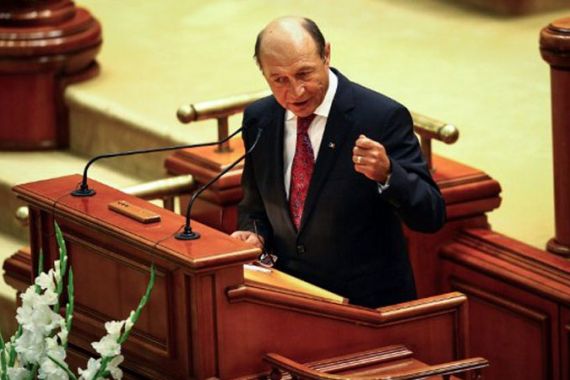Romania parliament votes to impeach president
Move over Traian Basescu’s alleged misuse of powers raises fears that ruling coalition is monopolising state control.

Romania’s parliament has voted to impeach President Traian Basescu in an overwhelming vote, paving the way for a national referendum that could see the divisive and increasingly unpopular leader ousted.
A total of 258 lawmakers out of 432 voted in favour of the move against Basescu on Friday, said Dan Radu Rusanu, a senator with the governing coalition.
But the impeachment will only take effect if approved in a referendum within 30 days. Basescu has held the powerful position for eight years.
The lawmakers voted to remove Basescu from his post over claims he improperly assumed the powers of the prime minister when he announced drastic austerity cuts in 2010.
Romania, then badly hit by recession, agreed to tough belt-tightening measures, including unpopular public sector wage and benefit cuts, in return for a multi-billion-dollar bailout from the European Union and IMF.
Basascu, speaking in parliament ahead of the vote, rejected the charges, and said the campaign against him had violated the rule of law and put at risk “the stability and reputation of the country”.
He accused the ruling Liberal Social Union (USL) coalition of trying to “control all the levers of the state, especially the judiciary”.
Obstacles removed
The USL cabinet sparked widespread concern when on Wednesday it approved a decree barring the constitutional court from ruling on parliamentary decisions – removing what could have been an obstacle to Basescu’s impeachment.
The court had made a rare statement this week complaining of “virulent attacks” against some of its judges whom the government was threatening to sack.
The government withdrew its complaints against the judges but then adopted an emergency order curbing the court’s powers.
Other controversial moves have included sacking the opposition speakers of both houses of parliament and replacing the ombudsman – who has the sole power to contest government decrees and emergency orders – with a USL member.
The constitutional court ruled on Friday that Basescu had indeed committed some breaches of his prerogatives but no violations of the constitution.
The coalition government led by Victor Ponta, the country’s prime minister, had given the top court a day to give an opinion on seven charges against him.
Two decades after Romania emerged from communist dictatorship, it has been thrown into turmoil by a bitter feud between Basescu and his arch-rival, the centre-left leader Ponta.
Removing checks and balances
Western powers have voiced fears that Ponta’s coalition government, which took office only in May, has been eroding democratic checks and balances in its campaign to oust Basescu.
This week, Ponta’s USL fired the speakers of both houses of parliament and the ombudsman and threatened to sack judges of the Constitutional Court.
The United States and European Union as well as France, Germany, the Council of Europe and several rights groups, including Freedom House and the Helsinki Committee, have all expressed concern.
“The rule of law, the democratic checks and balances and the independence of the judiciary are cornerstones of the European democracy and indispensable for mutual trust within the European Union,” the European Commission warned.
The political crisis in one of Europe’s poorest countries has seen the leu currency nosedive in recent days.
Ponta has sought to allay Western fears, pledging to travel to Brussels next week to “give assurances” to the bloc which Romania joined in 2007.
Germany has voiced “deep concern,” saying “the Romanian Constitutional Court’s independence and ability to take action must not be questioned.”
German Chancellor Angela Merkel’s spokesman Steffen Seibert warned Berlin would “closely consult” with its EU partners on Romania’s bid for full membership of the visa-free Schengen zone, which is up for review in September.
Ponta granted that Bucharest’s partners have “legitimate concerns” but insisted Romania “will remain a stable country in which the rule of law, the constitution, European and international standards will be respected”.
The turmoil came days after a scandal for Ponta, 39, who was found to have plagiarised parts of his PhD thesis.